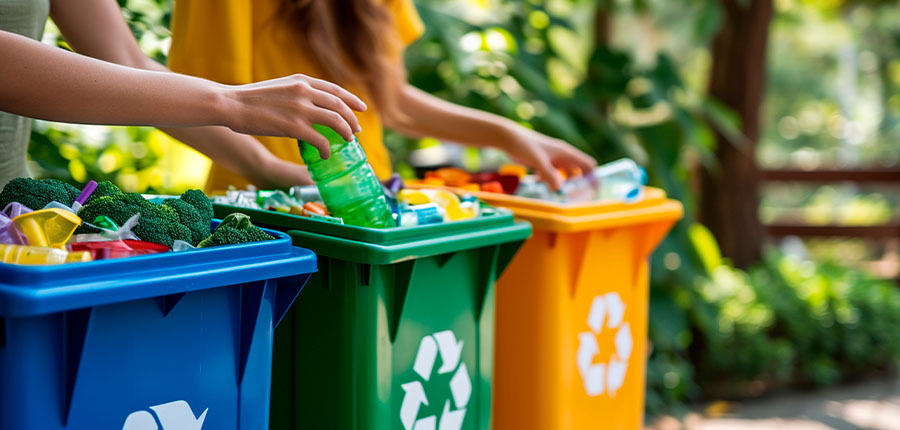
In an era where environmental sustainability is of paramount importance, hosting a zero-waste event has become a powerful way to minimize ecological impact while still celebrating and gathering together. A zero-waste event aims to produce little to no waste, reducing the carbon footprint associated with traditional gatherings.
From selecting the venue to managing waste effectively, each aspect of event planning plays a crucial role in ensuring a successful and eco-friendly celebration. Let's delve into the steps involved in organizing a zero-waste event that not only leaves a lasting impression but also contributes positively to the environment.
Choosing the Venue: Prioritising Spaces Committed to Sustainability
Selecting the right venue is the cornerstone of organizing a zero-waste event. Look for venues that share your commitment to sustainability and have implemented environmentally-friendly practices. Opt for spaces that utilize renewable energy sources, implement water-saving measures, or prioritize waste reduction. Outdoor venues, such as parks or gardens, provide natural beauty and require minimal decoration, reducing the need for additional resources. Additionally, consider the accessibility of the venue, choosing locations that are easily reachable by public transportation to minimize carbon emissions from guest travel. By prioritizing venues committed to sustainability, you set the stage for an eco-friendly event from the outset.
Waste Management: What Types of Waste, Planning Recycling and Composting
Food waste stands as a prominent concern, often stemming from overproduction, uneaten leftovers, and kitchen scraps. To combat this, meticulous menu planning is essential to ensure that food quantities align with guest attendance. Additionally, liaising with caterers to implement practices such as donating surplus food to local charities or food banks can help redistribute excess food to those in need. Furthermore, providing composting facilities for organic waste enables the diversion of food scraps from landfills, allowing them to be repurposed as nutrient-rich compost for future use.
Packaging waste, including wrappers, containers, and single-use plastics, represents another significant challenge. To address this, encourage using minimal or biodegradable packaging materials. Furthermore, ensure the availability of clearly labeled recycling bins for guests to dispose of packaging waste responsibly. By prioritizing sustainable packaging options and facilitating recycling, the volume of packaging waste generated can be substantially reduced.
Disposable items such as plastic cups, utensils, and decorations contribute significantly to the overall waste stream. To mitigate this, offer reusable alternatives or opt for rental services for crockery, glassware, and decorations. Educate attendees on the importance of reusing items and provide clear instructions for proper disposal. Collaborate closely with your guests to minimize the use of disposable items and promote eco-friendly alternatives. By emphasizing reusability and reducing reliance on disposable items, the generation of waste can be minimized, fostering a more sustainable event environment.By implementing strategies tailored to each waste category, such as careful menu planning, sustainable packaging alternatives, and reusable options, event organizers can significantly minimize waste generation and uphold their commitment to environmental sustainability.

Crockery and Decorations: Opting for Hire
One of the major contributors to waste at events is disposable crockery and decorations. To minimize waste and reduce environmental impact, consider opting for hire options for crockery, glassware, and decorations. Rental companies offer a wide range of options, from elegant tableware to stylish decorations, allowing you to create a beautiful and eco-friendly ambiance without resorting to single-use items. By choosing hire options, you not only eliminate the need for disposable products but also support a circular economy where items are reused and repurposed, further reducing waste. Additionally, consider using sustainable and biodegradable materials for decorations, such as recycled paper or natural fabrics, to minimize environmental impact further.
Don't hesitate to opt for furniture hire, to complete your overall look, while remaining eco-friendly. When considering the ambiance of your event, furniture hire offers a versatile solution that not only enhances the atmosphere but also supports sustainability efforts. Choosing furniture hire allows you to select from a range of stylish and eco-friendly options. This approach minimizes the environmental impact of your event while still achieving the desired aesthetic and functionality.


® Phoography : @Philippa Sian ® Photography : @conormuirc
Mobilising and Raising Awareness Among Your Guests
Mobilizing your guests and raising awareness about the importance of zero-waste practices is key to the success of your eco-friendly event. Prior to the event, communicate your commitment to sustainability through invitations, social media, and event websites. Encourage attendees to carpool or use eco-friendly transportation options to reduce emissions, and provide incentives for those who choose sustainable travel methods. During the event, engage guests in interactive activities and workshops focused on environmental sustainability, such as composting demonstrations or upcycling workshops. Provide opportunities for attendees to take action, such as pledging to reduce their waste or supporting local environmental initiatives. By empowering your guests to make environmentally conscious choices, you not only reinforce the message of sustainability but also inspire them to adopt eco-friendly practices in their daily lives.
In conclusion, organizing a zero-waste event requires careful planning, thoughtful decision-making, and active engagement with attendees. By choosing sustainable venues, opting for hire options, implementing effective waste management strategies, and mobilizing your guests, you can create an eco-friendly celebration that leaves a positive impact on the environment. Together, we can pave the way towards a more sustainable future, one event at a time.











